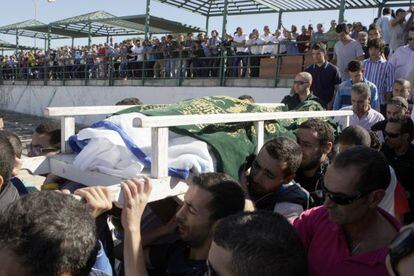Thousands take to streets of Melilla after Moroccan navy shooting deaths
Exclave unites to demand investigation into killings of two Spanish citizens

Thousands of people protested in Melilla over the weekend after the burial of two Spaniards who were shot dead by the Royal Moroccan Navy on October 27. "Morocco kills; Spain is silent!" chanted a large crowd on the border post of Beni Anzar, obliging the Spanish police to close the crossing for 45 minutes. "We're not Moroccan, we're Spanish!" was another slogan aimed at the security forces on the other side of the fence. "We shouted as loud as we could so they would hear us," said one protestor.
The demonstration later moved to the offices of the central government delegate in Melilla, Abdelmalik el Barkani. "This passivity leads us to think we are second-class Spaniards," said social activist Yonaida Selam.
The incident that sparked Melilla's anger, and some harsh words from the Popular Party (PP) mayor-premier of the exclave, Juan José Imbroda, took place in Moroccan territorial waters. Two Spaniards, Abdeselam Ahmed Ali, known as Pisly, 24, and Amin Mohamed Driss, 20, were aboard a small vessel off Punta Negri, around 100km from Melilla. A navy patrol boat approached and ordered the young men to stop. The official version provided by the Moroccan navy and released by the country's MAP news agency is that this order was ignored, that Amin and Pisly tried to ram the pursuing vessel, leading the Moroccan sailors to fire warning shots. When the smaller vessel again refused to stop, lethal shots were fired from a distance, killing both instantly. In the official report, the Moroccan navy does not accuse the Spaniards of suspected drug-running, but does state they "took flight" when challenged.
However, the parents of the two men offer a very different version of events after having had access to the bodies and speaking to the doctor who carried out the initial autopsy in Nador, Morocco. The forensic investigator said he had removed "20 or 25 pieces of lead from the liver and stomach," of Pisly while Amin had been "shot through the neck."
Anyone who knows even a little about guns would know they were shot at close range"
"Anyone who knows even a little about guns would know this means they were shot at very close range," Abdeselam, Pisly's father, told Europa Press. "When we saw the bodies we saw that they had several blows to the face; we think these were from a rifle butt. I imagine they stood up for themselves." Amin and Pisly had gone fishing, according to their friends and family, with their passports stamped and all the necessary permits.
The parents also believe that the intention of the naval personnel involved was to leave the bodies in the water because the clothes returned to them were still wet. As the pursuit was unfolding, the Spaniards managed to telephone friends to tell them they were being attacked by the Moroccan navy. These then phoned the Moroccan Gendarmerie: "A colonel ordered them to bring the bodies back," said Abdeselam. Imbroda described the incident as a "brutal assassination." Amin's uncle, Mustafa Mohamed, said reports had reached the families that the order to fire had been issued by a member of the Moroccan navy based in nearby Alhucemas "who has been involved in other incidents of brutality."
"We do not want to condemn an entire country like Morocco, but we do want the authorities to investigate and for the person or persons responsible to be tried," added Mohamed. Imbroda attended the funerals and rally on Saturday, one of the largest protests ever witnessed in Melilla, and has spoken in favor of urging the Moroccan Embassy in Madrid to force an investigation into the shootings. "We have to demand responsibility for these murders," he said.
"We defend the Spanishness, in capital letters, of these two citizens of Melilla," added Miguel Marín, the PP number two in the exclave, with an unfortunate aside: "Despite their surnames, they were Spanish [...]."
As of Monday, the central government delegate had limited himself to stating that an investigation is required "to clear up the circumstances and excesses of this unfortunate incident."










































